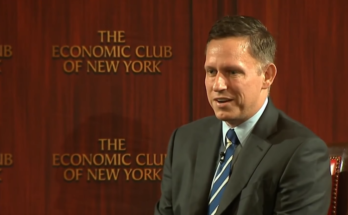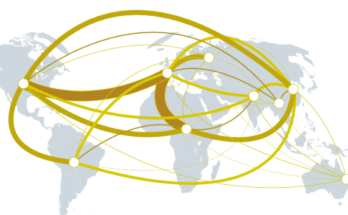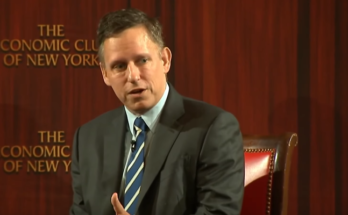Could be the Chinese century. Could be the Indian century. Could be the Spanish century. Could be the African century.
Rockefeller, with $50m, Revolutionized Health Care – Charlie Munger

Munger in a 2018 interview:
“John D. Rockefeller the First, by spending $50m way back decades ago utterly revolutionized American medical care. He got all the charlatans out of the medical profession by changing all the state laws, and he had all the medical schools imitate Johns Hopkins, which had imitated Germany, and when his $50m was spent, the whole of American medicine was improved enormously.
“Now he did that as a public service, and not many people realize how much public service J.D. Rockefeller the First created.
“I’ve always admired what Rockefeller did, and the man who talked him into it, Simon Flexner, who also created Einstein’s home at the Institute for Advanced Study.”
[somryv url=”bp0Opvf_9Co” size=”large” align=”center”]
Land Air Sea Journal
Netlimiter and Windows
Oh, rempl. It’s been awhile so they’re behind if they’re just noticing it now.
I don’t recall which post you were seeing, so I’d recommend runasti64 if you want to get this under control, because it’s attached to some scheduled tasks you won’t be allowed to disable. This program opens an elevated cmd as the TrustedInstaller access, from there you can launch a program for equivalent permissions (taskschd.exe). That way you can disable or delete the tasks responsible for this behavior. Helps in lots of other instances where Windows now locks us out of controlling certain behavior–like I recently posted on the new smartscreen.exe behavior as of 1803/1809.
Since you asked, I’ve been a supporter of Net Limiter since XP. It’s literally the first program I put on a new Windows system before I’ll even connect it online, then set the default blocker behavior to ASK. That way I’m prompted when any process on my system tries to connect inbound or outbound. So it takes time to shape rules but I’ve cut down so much bullshit just among Windows, especially since Win10 turned into spyware.
NL works with IPs and ports, so DNSQuerySniffer is useful to help shape those rules, because this will log any time your system is trying to resolve hosts and what those IPs are actually resolving to. That gives you the best insight when it comes to controlling traffic, since you may want program X to be able to reach a site to download images–for example–but you don’t want it connecting to Google because it’s purely tracking built into the app.
…
You set to Ask on inbound+outbound, then what?
The Blocker tab works like a standard firewall by processing rules in order of top > bottom. So if I have an Out rule that says Firefox can connect to 10.0.0.5:53; then an Out rule saying Firefox is blocked for everything; Firefox can connect to 10.0.0.5 on port 53 and everything else it attempts is blocked. Change the order so the 10 rule is beneath the block everything, and everything is blocked because it will process that before it allows.
So at the very bottom of the list should be an In and Out System rules. That’s going to be connectivity essential to Windows, very basic functions with port 0, NetBIOS, DHCP, APIPA. You can try limiting it to private subnets like 192.128.0.0/16, fe80::, ports like 137 and 138 etc but I just permit all because Microsoft does not ever run anything over System. And if you deny it, you’re going to block the fundamental operations of Windows networking.
After that you’re free to set any rules, one to watch out for is svchost.exe because a Windows OS attaches numerous running services (check services.msc) to this process. It could be anything from BITS to wuauserv so you’d also need to pay attention to the process ID reported by NL matched against the PID reported in task manager.
…
Another one you’ll see is dashost.exe. It’s okay to allow this completely or exempt specific ports, but this is purely for your LAN connectivity, bluetooth, file sharing. You should see ports like 1900, 3702, 2869. You can search for these and see they’re associated with UPnP, broadcasts. So that’s another one that if you block it, you’re breaking basic OS functions unless you wanted to isolate the system on LAN for some reason.
Our Grandparents Went to the Moon

Steel-man Instead of Straw-man?
A term introduced by Peter Thiel:
“In debates and political conversations our temptation is always to straw-man the other side: to find the most ridiculous thing somebody says, to zero in on that, to exaggerate it even more, and to sort of use that to make the political opponent appear silly and ridiculous.
“And I sort of think we’d be often well-served to do the opposite of straw-maning. And a word one of my colleagues came up with is ‘steel-man.’ We should steel-man the people we disagree with. We should think about how we can make their arguments even better than they make them. Even if they’re expressing their arguments in a bad way, what are the real underlying issues that those arguments reflect? How can we address those real underlying issues?
Where is the Charismatic Technology? According to Peter Thiel
Thiel at the Economic Club of New York on March 16, 2018:
“Which aspects of technology are actually charismatic? Where it’s a good story… where it’s a story about technology making the world a better place? And it needs to also be real; it needs to be a viable business, but at least I think you want it to be something that inspires people, that motivates the people in the company. It’s not just about making money, but it really has some sort of transcendent mission.
“And I think my relatively short list on that in Silicon Valley is the crypto piece, where the people are motivated and do have this vision of a very, very different world that they’re trying to build.
“I think it’s still true of biotech, where you always have the story about creating cures for diseases and drastically improving human health.
“And I think Elon Musk is the other one where where it’s sort of deeply, deeply charismatic.”
“AI is possibly a little bit exaggerated, and it’s a hard word to get a handle on because it’s a … somewhat poorly defined term, but the thing that struck me is how uncharistmatic AI is at this point:
“‘It’s going to take our jobs, and after it takes our jobs, at the singularlity, it’s just going to kill everybody.’ I’m not sure that dystopian view is correct, but that’s what actually what most people believe. It’s what most of the Hollywood movies on AI believe. It’s what most people in New York city believe. It’s what most people even in Silicon Valley believe.
“We have to always ask this question: ‘Are these technologies good? How are they going to make the world better?’ And I think the answers for AI are quite weak.
“The virtual reality, the augmented reality. There’s parts of that that can be quite good, but again there’s this very dystopian narrative: It’s like a 20-something person in Japan holed up in their parents bedroom and never leaving their room playing video games all day. And that sort of distopian piece again seems to dominate.
“And I’d rather focus on the ones where there’s a powerful good story.”
Video interview of Thiel at Economic Club of New York, March 2018
Steel-man Instead of Straw-man?

A term introduced by Peter Thiel:
“In debates and political conversations our temptation is always to straw-man the other side: to find the most ridiculous thing somebody says, to zero in on that, to exaggerate it even more, and to sort of use that to make the political opponent appear silly and ridiculous.
“And I sort of think we’d be often well-served to do the opposite of straw-maning. And a word one of my colleagues came up with is ‘steel-man.’ We should steel-man the people we disagree with. We should think about how we can make their arguments even better than they make them. Even if they’re expressing their arguments in a bad way, what are the real underlying issues that those arguments reflect? How can we address those real underlying issues?
Good YouTube Channels
Interesting for Thinking
Nexus Institute
Jerusalem Center
Rubin Report
Municipal Art Society of NY
The Monthly
Heritage Foundation
Economist
Aspen
The AI Channel
Stories
STIP Idealab
Space is Kind of Cool
Society of Geeks
Quinnipiac U
PBS Infinite
ORF India
Mises
Milken
Isaac Arthur
Harvard Law
Gresham College
Gad Saad
Council on Foreign Relations
Bill Kristol
Colttaine
Changling9au
CIGI
CSIS
CLG
Black Pigeon
JCCSF
Amicus Humani
American Voice for Freedom
American Enterprise Institute
AFP Online
1791L
Pop Blogs
Modern Rogue
Science Channel
Scam School
RC Anime
NYPD Exposed
News B Funny
Japan Society NYC
Japanology
News Videos
Fifth Estate
Daily Signal
Canadian Press
Russia Insider TV
KCET
INRUSSIA
Fact Point Video
Euractiv
DW English
Channel 4 News
C-SPAN
AP
AFP News
Things
Stealthb2777
Sony
Motor Trend
Military Archive
Knobs
IJ Net Video
Harold’s Planet
Fusion (Food)
Film Courage
Exploring Alternatives
EFF
Daily Aviation
Carykh (AI)
Boston Dynamics
Brandon Rohrer (AI)
Bea PI
Armed Forces Update
AIIR Source
For Music Channels, click here.
How Higher Costs Help the Biggest Companies - Peter G. Klein
Does any business like higher costs? Does any company like increased regulations, whether good or bad, which make it more difficult to operate? Does any company want a government that does this type of thing, and will support such a government?
Yes, in a competitive market, those types of difficulties benefit the biggest companies, who have the resources to do these things easily, and which will make business relatively harder for their smaller business competitors who might even go out of business. It’s in their interest to support governments who promise and execute these types of governmental actions, making it costlier to do business.
Economist Peter G. Klein, speaking at a recent Mises podium, gave some examples of this:
“Walmart can easily afford to design the parking lot in a certain way to make sure there are no steps as you enter the store. It’s easy for Walmart to do, and of course Walmart Corporation has hundreds, maybe thousands, of attorneys and compliance officers and all sorts of folks who specialize in understanding the regulations and making sure the firm is in compliance. Mom and Pop stores don’t have that. They can’t afford to build a ramp instead of stairs. They can’t afford to re-pave their parking lot. They don’t have a lawyer on retainer who can help them decipher the latest requirement of the Americans with Disabilities Act.
“So large companies often lobby for more regulation, for stricter government requirements on disclosure and so forth, because they know they can afford it and their smaller, newer rivals cannot afford it.”
Where is the Charismatic Technology? According to Peter Thiel

Thiel at the Economic Club of New York on March 16, 2018:
“Which aspects of technology are actually charismatic? Where it’s a good story… where it’s a story about technology making the world a better place? And it needs to also be real; it needs to be a viable business, but at least I think you want it to be something that inspires people, that motivates the people in the company. It’s not just about making money, but it really has some sort of transcendent mission.
“And I think my relatively short list on that in Silicon Valley is the crypto piece, where the people are motivated and do have this vision of a very, very different world that they’re trying to build.
“I think it’s still true of biotech, where you always have the story about creating cures for diseases and drastically improving human health.
“And I think Elon Musk is the other one where where it’s sort of deeply, deeply charismatic.”
“AI is possibly a little bit exaggerated, and it’s a hard word to get a handle on because it’s a … somewhat poorly defined term, but the thing that struck me is how uncharistmatic AI is at this point:
“‘It’s going to take our jobs, and after it takes our jobs, at the singularlity, it’s just going to kill everybody.’ I’m not sure that dystopian view is correct, but that’s what actually what most people believe. It’s what most of the Hollywood movies on AI believe. It’s what most people in New York city believe. It’s what most people even in Silicon Valley believe.
“We have to always ask this question: ‘Are these technologies good? How are they going to make the world better?’ And I think the answers for AI are quite weak.
“The virtual reality, the augmented reality. There’s parts of that that can be quite good, but again there’s this very dystopian narrative: It’s like a 20-something person in Japan holed up in their parents bedroom and never leaving their room playing video games all day. And that sort of distopian piece again seems to dominate.
“And I’d rather focus on the ones where there’s a powerful good story.”
Video interview of Thiel at Economic Club of New York, March 2018
How Globalization is Supposed to Look, According to Peter Thiel

“The way you’d expect things to be working in a healthily globalized world is that capital would flow from the slow-growing to the fast-growing economies — from the developed to the developing world.
“This was the way the trade patterns looked in 1900, which was a relatively open free trade world where the UK had a current account surplus of 4% of GDP and the capital got exported to invest in Russian railroads or Argentina or all sorts of other countries that had higher growth rates and promised a higher return on capital. That’s the way globalization is supposed to look.
“Today, it’s quite the opposite, where the capital is flowing uphill from China to the US and it’s sort of the other side of these enormous current account and trade deficits the United States has. And so we’re sort of exporting $100b a year to China and importing and importing $450b a year from China, and then China is an economy that’s growing let’s say 6.5% a year and is investing in an economy that maybe is growing 3% a year when the flow should be the other way around.”
Video interview of Thiel at Economic Club of New York, March 2018
Word of the Day: Granular

Peter Thiel: “There are a lot of very granular questions that we need to be asking [about global trade and specifically US-China trade.”
Granularity is a measure of the degree of specificity at issue. As Henry points out, this is a metaphor.
How big a grain size do you want? You can speak of fine-grained, medium-grained, or coarse-grained analyses or details. Fine-grained means that many minor details are accounted for; coarse-grained means it’s a Big Picture, with lots of generalizations and few details.
Being specific is not always so important as having just the right granularity.
Answer by John Lawler
A source: Stack
Good YouTube Channels
Interesting for Thinking
Nexus Institute
Jerusalem Center
Rubin Report
Municipal Art Society of NY
The Monthly
Heritage Foundation
Economist
Aspen
The AI Channel
Stories
STIP Idealab
Space is Kind of Cool
Society of Geeks
Quinnipiac U
PBS Infinite
ORF India
Mises
Milken
Isaac Arthur
Harvard Law
Gresham College
Gad Saad
Council on Foreign Relations
Bill Kristol
Colttaine
Changling9au
CIGI
CSIS
CLG
Black Pigeon
JCCSF
Amicus Humani
American Voice for Freedom
American Enterprise Institute
AFP Online
1791L
Pop Blogs
Modern Rogue
Science Channel
Scam School
RC Anime
NYPD Exposed
News B Funny
Japan Society NYC
Japanology
News Videos
Fifth Estate
Daily Signal
Canadian Press
Russia Insider TV
KCET
INRUSSIA
Fact Point Video
Euractiv
DW English
Channel 4 News
C-SPAN
AP
AFP News
Things
Stealthb2777
Sony
Motor Trend
Military Archive
Knobs
IJ Net Video
Harold’s Planet
Fusion (Food)
Film Courage
Exploring Alternatives
EFF
Daily Aviation
Carykh (AI)
Boston Dynamics
Brandon Rohrer (AI)
Bea PI
Armed Forces Update
AIIR Source
For Music Channels, click here.
How Higher Costs Help the Biggest Companies - Peter G. Klein
Does any business like higher costs? Does any company like increased regulations, whether good or bad, which make it more difficult to operate? Does any company want a government that does this type of thing, and will support such a government?
Yes, in a competitive market, those types of difficulties benefit the biggest companies, who have the resources to do these things easily, and which will make business relatively harder for their smaller business competitors who might even go out of business. It’s in their interest to support governments who promise and execute these types of governmental actions, making it costlier to do business.
Economist Peter G. Klein, speaking at a recent Mises podium, gave some examples of this:
“Walmart can easily afford to design the parking lot in a certain way to make sure there are no steps as you enter the store. It’s easy for Walmart to do, and of course Walmart Corporation has hundreds, maybe thousands, of attorneys and compliance officers and all sorts of folks who specialize in understanding the regulations and making sure the firm is in compliance. Mom and Pop stores don’t have that. They can’t afford to build a ramp instead of stairs. They can’t afford to re-pave their parking lot. They don’t have a lawyer on retainer who can help them decipher the latest requirement of the Americans with Disabilities Act.
“So large companies often lobby for more regulation, for stricter government requirements on disclosure and so forth, because they know they can afford it and their smaller, newer rivals cannot afford it.”
 " >
" >